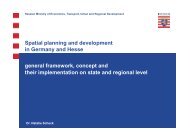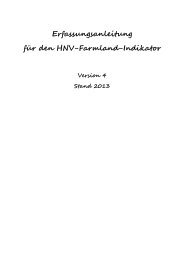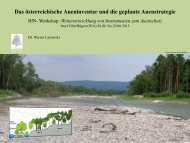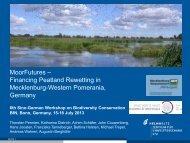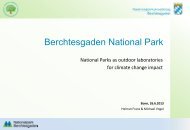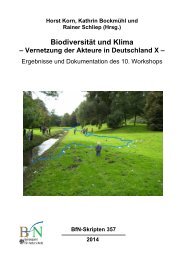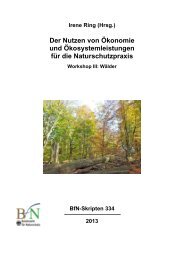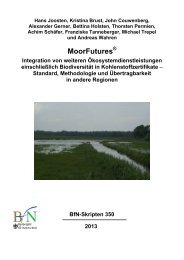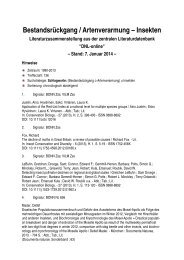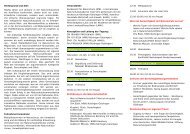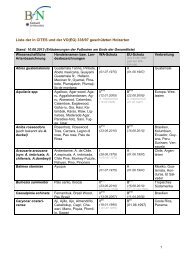Caring for Pollinators - Bundesamt für Naturschutz
Caring for Pollinators - Bundesamt für Naturschutz
Caring for Pollinators - Bundesamt für Naturschutz
You also want an ePaper? Increase the reach of your titles
YUMPU automatically turns print PDFs into web optimized ePapers that Google loves.
Ssymank Highlights - Zusammenfassung<br />
5. Highlights<br />
Considering the functional importance of pollinators in ecosystems worldwide, the pollinator<br />
decline due to climate change and other causes with the risk of a major reduction in pollination<br />
capacity, the FAO 2008 first Rapid Assessment of <strong>Pollinators</strong>’ Status Report<br />
(http://www.cbd.int/doc/meetings/sbstta/sbstta-13/other/sbstta-13-fao-pollinators-en.pdf) the<br />
functional and economic importance of pollinators in all ecosystems worldwide, the presentations<br />
and discussion reiterated and stressed the following:<br />
1. a rein<strong>for</strong>cement of studies on pollination ecology<br />
• Rein<strong>for</strong>cement of fundamental taxonomic research, in order to reduce the large number<br />
of pollinators that remain undescribed or virtually unknown, even in the most<br />
"well-studied" regions:<br />
• The recognition of Hymenoptera and Diptera as the most important pollinator groups<br />
and flower visiting insects among a number of other pollinator groups;<br />
• Build determination tools/ keys <strong>for</strong> all key pollinator groups<br />
• Rein<strong>for</strong>cement of studies on pollination ecology (both in fundamental & applied research)<br />
• Enhancement and completion of in<strong>for</strong>mation on pollinator species, their ecology and<br />
functional interactions as a necessary basis <strong>for</strong> assessing pollination services and to<br />
maintain biodiversity<br />
• to systematically expand applied pollinator research to all crops (including regional<br />
crops)<br />
2. greater capacity-building<br />
• Greater capacity-building in institutions and higher levels of human resource development<br />
and training;<br />
• Maintenance and rein<strong>for</strong>cement of the activities of the existing pollinator initiatives,<br />
based on a review of the ongoing projects around the world;<br />
• Expansion of the activities of pollination initiatives to cover all major ecosystems & all<br />
major pollinator groups;<br />
• Creating a Non-Bee Pollinator Initiative/ Action Group and to put more emphasis on<br />
so far neglected groups like the Diptera.<br />
3. improved awareness and networking on pollinator issues;<br />
• The global economic importance of pollinators to sustainable crop production (food,<br />
biofuels, animal-feed-stuffs);<br />
• Awareness of pollination services to the maintenance of the diversity of medical<br />
plants and to plant diversity as a whole;<br />
• Improved communication, education and public awareness and networking on pollinator<br />
issues<br />
• Greater financial support and more political awareness <strong>for</strong> taxonomic initiatives relating<br />
to pollinator biodiversity, in cooperation with the Global Taxonomy Initiative (GTI)<br />
• systematic assessment of the value of pollination services <strong>for</strong> all major pollinator<br />
groups<br />
111





